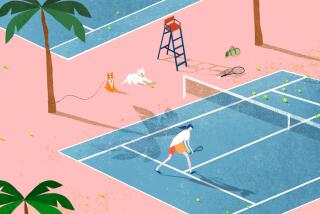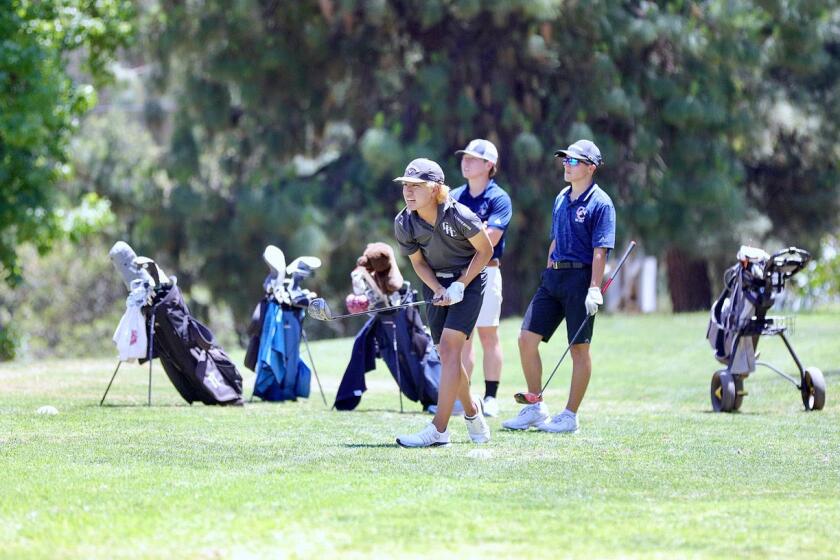A Much Wiser and Perhaps Finer Agassi
- Share via
When Andre Agassi was 17, when he had hair below his shoulders and a world of women, young and old, following him everywhere, when there were parties to be attended and adoration to be accepted and sometimes tennis to be played but maybe not practiced, it was hard to imagine Agassi winning tournaments when he was 25.
Now Agassi is 32. The hair is shaved and the only woman is Steffi Graf, his wife and the mother of his son, Jaden Gil. There is a coach, Darren Cahill, and a trainer, Gil Reyes. There aren’t many parties. There is the wonder of watching Jaden stop crying because he can eat a banana and the joy of discovering how Jaden never sits still, just like Graf.
And it is entirely possible to imagine Agassi playing tennis and winning tournaments when he is 37. It is not unimaginable to close your eyes and see Agassi holding over his head a U.S. Open trophy five years from now while a stadium filled with fans can’t stop cheering.
Sunday in the finals of the Mercedes-Benz Cup, Agassi ran 25-year-old Jan-Michael Gambill into the ground. Agassi beat Gambill, 6-2, 6-4, and at the end Gambill was staggering to his chair, searching out the shade while Agassi bowed and blew kisses to the heat-addled patrons sitting in the sun at UCLA.
Agassi had barely worked up a sweat in winning the title, the 53rd of his career. In no way was it one of the most meaningful titles of Agassi’s career. Those would be any of his seven Grand Slams.
But it was important. Agassi needs reassurance now. Every week he searches for signs that his game isn’t good enough, that he has reached the age where there is no stopping the losing.
This was Agassi’s first tournament since his desultory second-round Wimbledon loss to Paradorn Srichaphan. Agassi says he will know in his heart when he is unable to win tournaments any more. And he only wants to win tournaments. Being a quarterfinalist isn’t the point.
So for nearly a month Agassi has had to wait and wonder. Is it gone, his speed? Has it taken off, his strength? Is his superb timing just average now?
And then he came here and won.
There is a serene fury about Agassi’s tennis. There is precise power. There is wisdom. A beaten Gambill would say later, in wonder, that Agassi “plays better tennis than he used to. He’s cleaned up his errors. He doesn’t make errors any more.”
That’s the will of Agassi. The will to do it right, to hit hard but not too hard. To play the angles but not the sharpest angle. “I’ve learned,” Agassi says, “that it’s good not to miss. It always helps your cause if the ball goes back in play.”
It is also the will of Agassi to run longer and faster, to hit harder and harder, to punish instead of be punished.
That was proved in the second set. A rally had finished, a long one of more than a dozen strokes. All the time Agassi had Gambill’s fate on the head of his own racket. Gambill was pushed along the baseline, up to the net, back to the baseline and finally Agassi won the point with a blistering backhand.
Gambill dragged himself to the lone patch of shade and leaned on his racket and gasped for air, for energy, for an answer to this man across the net who is seven years older and so much more relentless.
As this tournament progressed, each of Agassi’s vanquished competitors seemed awestruck by tennis’ elder statesman.
Gustavo Kuerten, beaten in a wonderfully fought Friday night quarterfinal, said he only hoped to partly emulate Agassi’s professionalism and personality. “I try on the court with him to take from him that energy,” Kuerten, 26, said. “But when I am 32, I think I will be on the beach.”
Max Mirnyi, the semifinal loser, said it was an honor to lose to Agassi, “maybe the best player ever.”
And Gambill said it was his privilege to be beaten by the man with the best return of serve ever.
Agassi accepts this praise quietly. As a kid, when he would skip from title to title making brash predictions and accepting as his due the gushing admiration of a Barbra Streisand, Agassi was considered too much the punk and not enough a tennis gentleman.
Now Agassi is filled with the wisdom gained from his mistakes and an understanding of how glorious it can be to be playing tennis so well at the time when most men have had to move on.
“The work is harder now,” Agassi said. “It’s harder to be away from my child and my wife. On the other side of the coin, I’m at an age where I have the ability and capacity to absorb everything more and use it to my benefit.”
Agassi is more eager than a teenager to push his game ahead. “I enjoy challenging myself,” he said. “I enjoy playing the great matches. I enjoy feeling my game in ways I’ve never felt it before.”
So Agassi moves on to the rest of the summer, continuing his preparation for the U.S. Open and certain of his ability to win it. This year, and the next, maybe the next after that. “Why not,” Agassi said. No reason could be found on this afternoon. And no one wanted to.
*
Diane Pucin can be reached at diane.pucin@latimes.com
More to Read
Go beyond the scoreboard
Get the latest on L.A.'s teams in the daily Sports Report newsletter.
You may occasionally receive promotional content from the Los Angeles Times.










